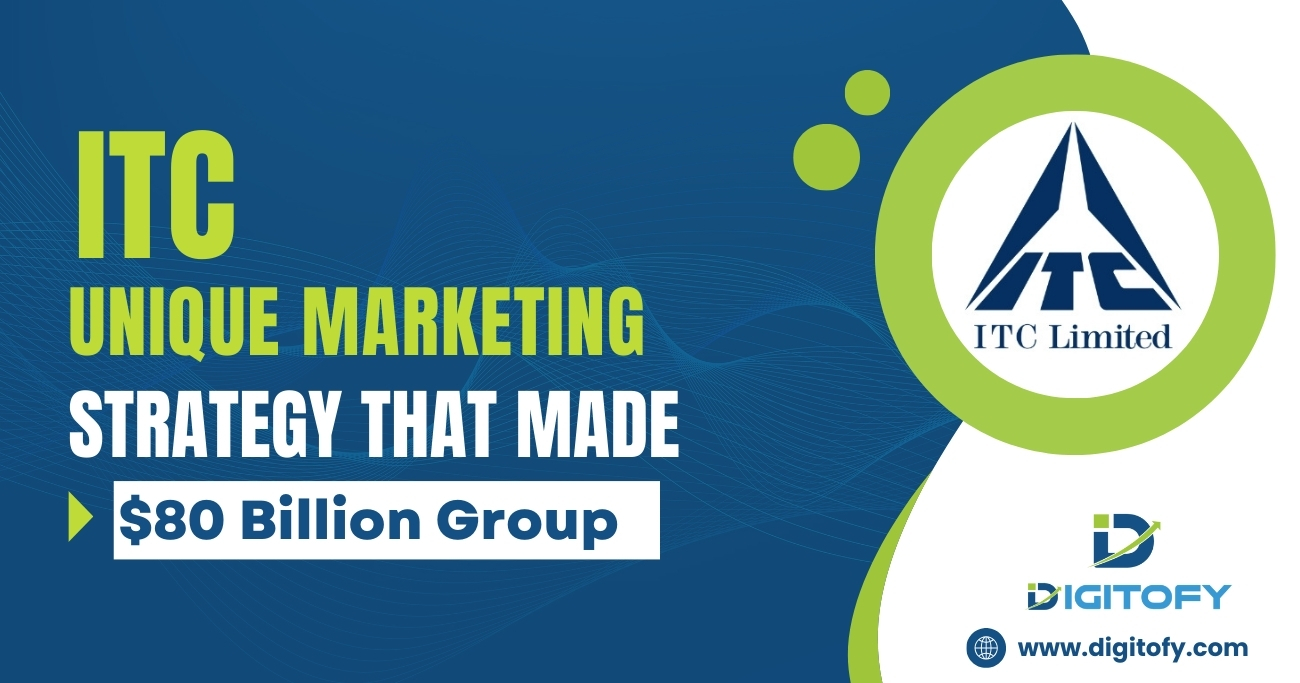ITC Unique Marketing Strategy That Made it into $80 Billion Group
Overview ITC is one of India’s most venerable and innovative companies. Founded in 1910 as the Imperial Tobacco Company of India Limited, the Kolkata-based conglomerate has transformed itself over the past century into a multi-business enterprise spanning cigarettes, hotels, paperboards, packaging, agri-business, and information technology. ITC ranks among India’s most valuable companies and is widely perceived to be “Indian to the core.
About ITC
From humble beginnings as a single-product export company shipping tobacco, ITC has transformed into a diversified conglomerate driving many of India’s most iconic and recognizable brands across several key industries. ITC operates through various business verticals, including Fast-Moving Consumer Goods (FMCG), Hotels, Paperboards and packaging, agribusiness, and Information Technology.
ITC’s FMCG segment features a portfolio of popular Indian brands across categories such as staples, snacks, personal care, and stationery. Well-loved ITC FMCG brands that can be found in millions of Indian households include Aashirvaad atta, Bingo chips, Sunfeast biscuits and cakes, Candyman confectionery, Fiama and Vivel personal care products, Classmate notebooks, and Paperkraft premium stationery.
Alongside its branded packaged goods, ITC also runs a chain of luxury hotels under the ITC Hotels brand with over 100 properties across India. The company also has significant paper and paperboard operations, and an agri-business division focused on rural development. With its diversified businesses and iconic brands, ITC has created considerable value for the Indian economy and society over its 100+ year journey.
What’s New with ITC
ITC has outlined visionary sustainability and social responsibility goals aligned with India’s development priorities. The company aims to meet 100% of its energy requirements from renewable sources and create rainwater harvesting potential equivalent to over twice its net water consumption by 2030. On the social responsibility front, ITC runs the e-Choupal initiative to empower rural communities through connectivity, knowledge, and customized services related to agriculture.
Buyer Personas
ITC serves diverse demographics through its range of products and services. For FMCG brands like Aashirvaad atta, Sunfeast biscuits, and Bingo chips, the buyers include middle-income household shoppers across urban and rural markets seeking quality packaged foods at affordable prices. For premium soap brand Fiama and cosmetics label Engage, urban professional women concerned with beauty and skincare form the target audience. The Classmate brand of notebooks and paper products caters to school-going children and youth across socio-economic segments.
Also, Watch Our YouTube Shorts Video on: Day 5 – ITC Unique Marketing Strategy That Made it into $80 Billion Group
Marketing Mix
ITC pursues innovative marketing strategies aligned with its diverse brands and their positioning.
Product Strategy
ITC has leveraged insights into local consumer preferences to drive product innovation and variety across target segments. For instance, Sunfeast offers over 100 SKUs customized for every Indian taste palate and appetite. The e-Choupal platform provides customized services to empower rural communities.
Price Strategy
With brands like Aashirvaad and Bingo serving price-sensitive masses, ITC offers competitive value pricing. For more premium brands like Fiama, Engage, and ITC Hotels, exclusive experiences justify excellent pricing. Products like Classmate offer durability and functionality at economic price points to drive adoption.
Place Strategy
ITC products ride on traditional trade networks and modern retail formats to ensure availability next to the neighborhood Kirana store and in large organized outlets. The distribution reach spans urban and rural markets, even in remote areas.
Promotions Strategy
ITC uses a judicious media mix of television, print, and digital marketing to drive awareness and engagement among target audiences with communication tailored to regional diversity. Rural activation programs enable experiential marketing for e-Choupal communities.
Competitor Analysis
ITC faces competition from leading national and regional players across its diverse businesses. For instance, Hindustan Unilever, Godrej Consumer Products, and Wipro Consumer Care vie for market share in personal and home care segments. Major biscuit brands such as Britannia, Parle, and Anmol compete with Sunfeast. Aashirvaad atta competes with market leader Pillsbury and other regional brands. Taj Group and Oberoi Hotels compete with ITC’s hotel brands.
Marketing Strategy
ITC deploys a variety of strategic levers to further its marketing objectives:
- Brand Portfolio Strategy: ITC has strategically built a portfolio of distinct brands across price points to cater to diverse consumer segments. For example, Fiama serves premium beauty consumers, while Superia targets more Economy-conscious buyers.
- Product and Brand Localization: Regional Indian taste preferences in categories like biscuits, snacks, spices, and bakery products differ widely. ITC has localized offerings state-by-state under brands like Sunfeast to reflect these differences.
- Experience Focus: For premium hotel properties under ITC Hotels, the company creates customized and world-class customer experiences to support exceptional pricing. Similarly in FMCG, it leverages “product experience” as a critical differentiator.
- Inclusive Sourcing and Distribution: With initiatives like e-Choupal and farmer linkages, ITC sources raw materials directly from rural suppliers and co-creates shared value. It serves kiranas and remote rural markets directly through extensive distribution reach.
Unique Success Factors
CSR and Rural Focus A key aspect of ITC’s marketing innovation involves integrating its business models tightly with more significant socio-economic priorities. Two stellar examples of this strategy:
- e-Choupal: This initiative delivers connectivity, information, and customized services related to agriculture, like procurement, weather, and crop health, to empower rural communities and deepen sourcing linkages directly with farmers.
- Notebooks Portfolio: Under ITC’s Classmate brand, the company has pledged to donate Rs. 1 for every four notebooks sold to educate underprivileged children. This helps drive rural impact, and consumers connect with the brand’s purpose.
The Bottom Line
ITC’s marketing strategy leverages the interplay of segmentation, targeting, positioning, and branding to address diverse consumer needs through a portfolio of distinctly positioned brands across segments, price points, and regions. The company’s focus on experience delivery, distribution reach, and win-win value creation makes it a marketing innovator with unique rural and CSR linkages, setting it apart as a sustainable and responsible organization.

.webp)

